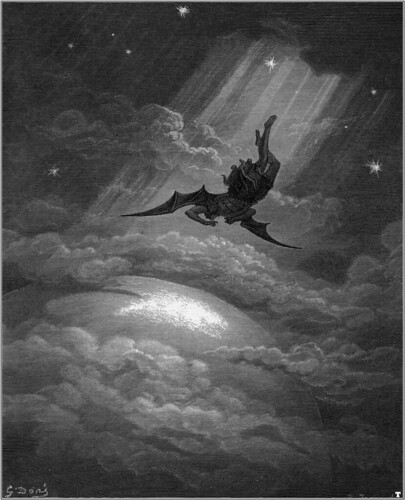We run our website the way we wished the whole internet worked: we provide high quality original content with no ads. We are funded solely by your direct support. Please consider supporting this project.
Our Beautiful, Nightmarish World
The Bible consistently proclaims that the creation reflects the glory of God. To me, the truth of this proclamation is undeniable. When I was younger I several times went on three-week solo backpacking trips into the mountainous forests of Montana. If gazing at the star studded sky on a moonless night at the peak of an 11,000 foot Montana mountain wouldn’t convince a person there’s a mind-bogglingly magnificent God behind this creation, I don’t know what would.
But the Bible and universal human experience also teach us that this “glory” isn’t the whole story.
That same God-glorifying starry sky looks down with indifference on terrified children sold into sexual slavery, war-torn countries, the ravages of disease, the aftermath of unimaginable natural disasters, and a planet that has known the incalculable suffering of events such the Holocaust and the genocide of Rwanda.
How can there be such a beautiful, nightmarish world? The biblical answer is that the world was created and is ultimately sustained by a beautiful God. But it has been seized and is now largely run by nightmarishly evil Powers.
A lot of people today, including a lot of Christians, find it hard to believe in things like Satan, rebellious angels and evil demons. And even some of those who say they believe in them feel awkward talking about them.
I empathize with this skepticism. Part of the reason for it, I suspect, is that we tend to think of Satan and demons as cartoon-like red entities with horns, hooves and pitchforks. These images are indeed mythic, borrowed mostly from pagan religions.
Nevertheless, while these images are mythic, there’s no reason to think that the evil realm they represent is mythic. The whole of the biblical narrative presupposes it’s real. Every aspect of Jesus’ ministry presupposes it’s real. Almost all people in all cultures throughout history have assumed this realm was real and often experienced it as real. And, in fact, there is a growing wealth of testimony from contemporary people, including a host of otherwise secular western anthropologists, that the supernatural realm is real, and that some of it is hostile.
I honestly don’t see how it is possible to explain how an all-good God could create a cosmos that is this screwed up without accepting that he’s opposed by forces of evil that operate on a cosmic scale. Appealing to human free will alone simply doesn’t cut it.
The world we live in looks like a war zone because the world we live in is a war zone. There is much that magnificently glorifies God, but there is also much that nightmarishly glorifies evil. An evil adversary and a rebel kingdom have seized the good creation. This adversary holds the earth and the humans who were supposed to rule it in bondage. Jesus came to change all this.
Jesus came to defeat the devil and end all his works (1 Jn 3:8; Heb 2:14). Through his life, ministry, death and resurrection he dealt a fatal blow to the powerful leader of the rebel regime and established a subversive revolution that he promised would ultimately end the enemy occupation and liberate the earth.
This is what Christianity is supposed to be. It’s not an orthodox club of people who believe all the right things. It’s not a holy club of people who always do all the right things. What Jesus rather came to establish was a movement of people who individually and collectively manifest the domain in which God is King and who revolt against every aspect of the domain in which Satan is king.
Category: Essays
Tags: Beauty, Essay, Evil, Kingdom, Kingdom Living, Satan, Warfare Worldview
Topics: Spiritual Warfare, Cosmic Conflict
Related Reading

How should evangelicals “do” theology?
A central debate among evangelical theologians concerns the question of theological method. In other words, how should we “do” theology? All evangelical Christians believe the Bible is God’s inspired revelation. Thus, evangelicals agree that Scripture must form the foundation for theological thought. But Scripture is not the only factor to consider when doing theology. Many…

Imaging God Wrongly: God’s Self-Portrait, Part 2
Our relationship with God depends on the way we imagine God. When we get the image of God right, the doors open for us to trust and relate to God in the ways we were created to do. But there are so many images of God that are entirely messed up. Just think about the…

The Kingdom, Just War Theory, and Ukraine
History textbooks often read like surveys of how countries handled war with other nations. The stuff between the conflicts reads like precursors and aftermath to the history-making actions of war. Now we observe the rising tension between Russia and Ukraine along with other world leaders as they try to determine how to respond. Sadly, church history…

Storming the Gates of Hell
Jesus said: “I will build my church, and the gates of Hades will not prevail against it.” (Mt 16:18) To understand Jesus’ teaching here, there are a few things you should know. First, “Hades” was the standard term for the underworld, which means that Jesus was probably referring to the whole of the Satanic kingdom.…

What Power Do You Trust?
Governments and nations have always relied on fighting to survive. They punish criminals who threaten their welfare. They go to war against enemies who attack their borders or stand in the way of their agenda. This is how the kingdoms of the world maintain law and order and advance their causes. By contrast, the Kingdom…

How Do You “See” God? God’s Self-Portrait, Part 1
When ReKnew first launched a year and a half ago, I planned on initially using the blog primarily to flesh out the theology and significance of the ReKnew Manifesto. As happens all-too-frequently in my ADHD world, that project got sidelined primary because of my obsession with finishing The Crucifixion of the Warrior God. Well, the…

